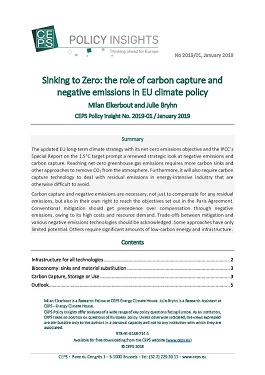Sinking to Zero: the role of carbon capture and negative emissions in EU climate policy
Sinking to Zero: the role of carbon capture and negative emissions in EU climate policy
Author(s): Milan Elkerbout, Julie Bryhn
Subject(s): Politics / Political Sciences, Politics, Social Sciences, Economy, Supranational / Global Economy, Energy and Environmental Studies, Sociology, Economic policy, Environmental and Energy policy, Social development, Economic development, Environmental interactions, EU-Approach / EU-Accession / EU-Development
Published by: CEPS Centre for European Policy Studies
Keywords: European Union; Eu climate policy; carbon capture; negative emissions; long-term climate strategy; zero-emissions; greenhouse gas emissions; CO2; bioeconomy; material substitution;
Summary/Abstract: The updated EU long-term climate strategy with its net-zero emissions objective and the IPCC’s Special Report on the 1.5°C target prompt a renewed strategic look at negative emissions and carbon capture. Reaching net-zero greenhouse gas emissions requires more carbon sinks and other approaches to remove CO2 from the atmosphere. Furthermore, it will also require carbon capture technology to deal with residual emissions in energy-intensive industry that are otherwise difficult to avoid. Carbon capture and negative emissions are necessary, not just to compensate for any residual emissions, but also in their own right to reach the objectives set out in the Paris Agreement. Conventional mitigation should get precedence over compensation through negative emissions, owing to its high costs and resource demand. Trade-offs between mitigation and various negative emissions technologies should be acknowledged. Some approaches have only limited potential. Others require significant amounts of low-carbon energy and infrastructure.
Series: CEPS Policy Insights
- E-ISBN-13: 978-94-6138-714-1
- Page Count: 6
- Publication Year: 2019
- Language: English
- eBook-PDF
- Introduction

